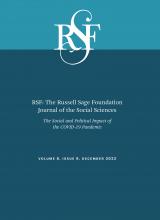Research Article
Open Access
COVID-19 and the Culture of American Federalism
Emily Pears, Emily Sydnor
RSF: The Russell Sage Foundation Journal of the Social Sciences December 2022, 8 (8) 181-220; DOI: https://doi.org/10.7758/RSF.2022.8.8.09
Emily Pears
aAssistant professor of government at Claremont McKenna College, United States
Emily Sydnor
bAssociate professor of political science at Southwestern University, United States

REFERENCES
- ↵
- Albertson, Bethany, and
- Shana Kushner Gadarian
- ↵
- Barber, Bernard
- ↵
- ↵
- ↵
- Bulman-Pozen, Jessica
- ↵
- Campbell, Angus,
- Philip E. Converse,
- Warren E. Miller, and
- Donald E. Stokes
- ↵
- ↵
- Centers for Disease Control and Prevention (CDC)
- ↵
- Chiang, Chun-Fang, and
- Brian Knight
- ↵
- Choudhry, Sujit
- ↵
- Cramer, Katherine J
- ↵
- Delli Carpini, Michael X., and
- Scott Keeter
- ↵
- Dinan, John, and
- Jac C. Heckelman
- ↵
- Easton, David
- ↵
- Elazar, Daniel J
- ↵
- Evans, John H., and
- Eszter Hargittai
- ↵
- Faul, Franz,
- Edgar Erdfelder,
- Axel Buchner, and
- Albert-Georg Lang
- ↵
- Feeley, Malcolm M., and
- Edward Rubin
- ↵
- Funk, Cary,
- Meg Hefferon,
- Brian Kennedy and
- Courtney Johnson
- ↵
- Gallup
- ↵
- Gamson, William A
- ↵
- Green, Donald P.,
- Bradley Pamquist, and
- Eric Schickler
- ↵
- ↵
- Grossman, Guy,
- Soojong Kim,
- Jonah M. Rexer, and
- Harsha Thirumurthy
- ↵
- Hetherington, Marc J
- ↵
- Hetherington, Marc J., and
- John D. Nugent
- ↵
- Hopkins, Daniel J
- ↵
- Huddy, Leonie, and
- Nadia Khatib
- ↵
- ↵
- Ipsos
- ↵
- Jacobs, Nicholas F., and
- B. Kal Munis
- ↵
- James, Sarah,
- Caroline Tervo, and
- Theda Skocpol
- ↵
- Jennings, M. Kent, and
- Harmon Zeigler
- Jones, Jeffrey M
- ↵
- Kelleher, Christine A., and
- Jennifer Wolak
- ↵
- Kennedy, Courtney,
- Andrew Mercer Scott Keeter,
- Nick Hatley,
- Kyley McGeeney, and
- Alejandra Gimenez
- ↵
- ↵
- Lenz, Gabriel S
- ↵
- Levay, Kevin E.,
- Jeremy Freese, and
- James N. Druckman
- ↵
- Levi, Margaret
- ↵
- Levi, Margaret
- ↵
- Levy, Jacob T
- ↵
- Marien, Sophie, and
- Marc Hooghe
- ↵
- McCarthy, Justin
- ↵
- Miller, Arthur H
- ↵
- Morisi, Davide,
- John T. Jost, and
- Vishal Singh
- ↵
- Newport, Frank
- ↵
- Newport, Frank
- ↵
- Newport, Frank
- ↵
- Oreffice, Sonia, and
- Climent Quintana-Domeque
- ↵
- Page-Tan, Courtney,
- Summer Marion, and
- Daniel P. Aldrich
- ↵
- Pagliaro Stefano,
- Simona Sacchi,
- Maria Giuseppina Pacilli,
- Marco Brambilla,
- Francesca Lionetti,
- Karim Bettache, et al
- ↵
- ↵
- ↵
- Pew Research Center
- ↵
- Prolific Team
- ↵
- Rattay, Petra,
- Niels Michalski,
- Olga Maria Domanska,
- Anna Kaltwasser,
- Freia De Bock,
- Lothar H. Wieler, and
- Susanne Jordan
- Roawhouser-Mylet, Georgia, and
- Peter Hanson
- ↵
- Richardson, Lilliard E.,
- David M. Konisky, and
- Jeffrey Milyo
- ↵
- Riker, William H
- Saad, Lydia
- ↵
- Schildkraut, Deborah J
- Schildkraut, Deborah J.,
- Jeffrey M. Berry, and
- James M. Glaser
- ↵
- ↵
- ↵
- Scholz, John T., and
- Mark Lubell
- ↵
- Stokes, Donald E
- ↵
- Suhay, Elizabeth,
- Aparna Soni,
- Claudia Persico, and
- Dave E. Marcotte
- ↵
- Theiss-Morse, Elizabeth
- ↵
- ↵
- Tyson, Alec
- ↵
- Uslaner, Eric
- ↵
- ↵
- Wolak, Jennifer
- ↵
- Zaller, John R
- ↵
- Zhao, Erfei,
- Qiaoa Wu,
- Eileen M. Crimmins, and
- Jennifer A. Ailshire
In this issue
COVID-19 and the Culture of American Federalism
Emily Pears, Emily Sydnor
RSF: The Russell Sage Foundation Journal of the Social Sciences Dec 2022, 8 (8) 181-220; DOI: 10.7758/RSF.2022.8.8.09
Jump to section
Related Articles
- No related articles found.
Cited By...
- No citing articles found.





